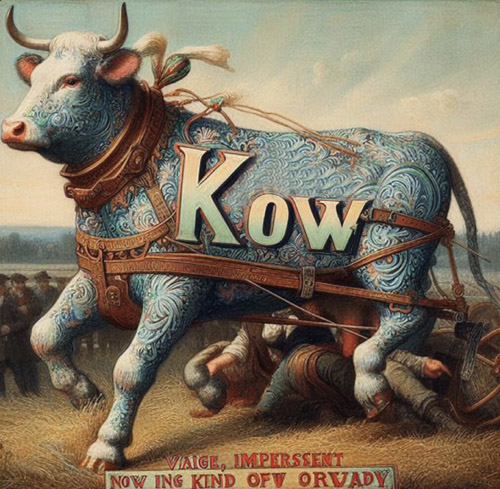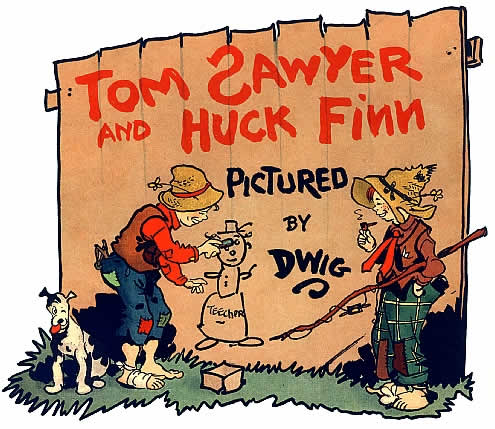

| I don't see any use in having a uniform
and arbitrary way of spelling words. We might as well make all clothes alike
and cook all dishes alike. Sameness is tiresome; variety is pleasing. I
have a correspondent whose letters are always a refreshment to me, there
is such a breezy unfettered originality about his orthography. He always
spells Kow with a large K. Now that is just as good as to spell it with
a small one. It is better. It gives the imagination a broader field, a wider
scope. It suggests to the mind a grand, vague, impressive new kind of a
cow. - speech, May 12, 1875. "Spelling Match and Festival," Hartford Courant, May 13, 1875 |
 AI image created by Barbara Schmidt |
| I have had an aversion to good spelling
for sixty years and more, merely for the reason that when I was a boy there
was not a thing I could do creditably except spell according to the book.
It was a poor and mean distinction and I early learned to disenjoy it. I
suppose that this is because the ability to spell correctly is a talent,
not an acquirement. There is some dignity about an acquirement, because
it is a product of your own labor. It is wages earned, whereas to be able
to do a thing merely by the grace of God and not by your own effort transfers
the distinction to our heavenly home--where possibly it is a matter of pride
and satisfaction but it leaves you naked and bankrupt. - Autobiography of Mark Twain, Vol. 1 (2010) |
 Artwork from Dwig's 1925 promo album for the Stoll and Edwards Tom and Huck game from the Dave Thomson collection. |
|
Why, there isn't a man who doesn't have to throw out about fifteen hundred
words a day when he writes his letters because he can't spell them! It's
like trying to do a St. Vitus dance with wooden legs. ...simplified spelling is all right, but, like chastity, you can carry
it too far. In truth there is a certain sardonic propriety in preserving our orthography,
since ours is a mongrel language which started with a child's vocabulary
of three hundred words, and now consists of two hundred and twenty-five
thousand; the whole lot, with the exception of the original and legitimate
three hundred, borrowed, stolen, smouched from every unwatched language
under the sun, the spelling of each individual word of the lot locating
the source of the theft and preserving the memory of the revered crime. |
|
The Atlanta Constitution, April 22, 1906,
p. E3
MARK TWAIN ON SPELLING REFORM. Mark Twain does not believe that the project of the Carnegie spelling reformers will succeed. "It won't happen," he says, "and I am sorry as a dog. For I do love revolutions and violence." He believes, however, that the reform could be made effective if it were done "by a sudden and comprehensive rush"; but he doubts if the effort at a slow and gradual change is worth while. "It is," he says, "the sudden changes in principles, morals, religious, fashions, and tastes that have the best chance of winning in our day. Suppose all the newspapers and periodicals should suddenly adopt a Carnegian system of phonetic spelling--what would happen? We all know quite well what would happen. To begin with, the nation would be in a rage; it would break into a storm of scoffs, jeers, sarcasms, cursings, vituperations, and keep it up for months--but it would have to read the papers; it couldn't help itself. By and by, and gradually, the offensive phonetics would lose something of their strange and uncanny look; after another by and by they would lose all of it, and begin to look rather natural and pleasant; after a couple of years of this, the nation would think them handsome, sane, and expressive, and would prefer them to any other breed of spelling." |
Quotations | Newspaper Articles | Special Features | Links | Search